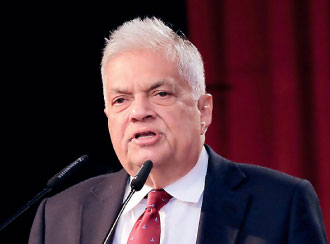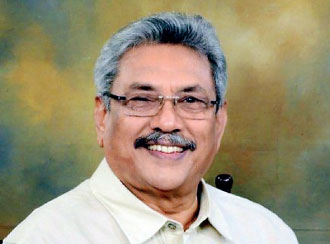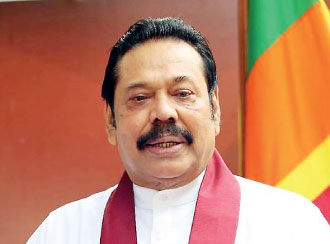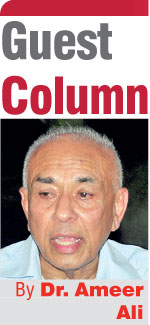Saturday Feb 14, 2026
Saturday Feb 14, 2026
Monday, 9 October 2023 00:16 - - {{hitsCtrl.values.hits}}

President Ranil Wickremesinghe

Former President Gotabaya Rajapaksa

Former President Mahinda Rajapaksa
|
 The IMF’s 128 page diagnostic document released after auditing Sri Lanka’s economic performance over the last 12 months since receiving the first tranche of $ 2.9 billion EFF has been received with shock and awe by different segments of local political groups and the intelligentsia. But to those who studied closely the history of political economy and governance of this country since independence the only novelty about the report is that it comprehensively lists in technical language the ills of the country’s system of governance with an underlying warning that if those ills are not attended to with urgency and removed within a certain time frame the IMF’s continued assistance and economic recovery would be thrown into jeopardy. Therefore, the task that lies before the nation is simply a wholesale and paradigmatic change of the prevailing socio-economic structure and its political culture. To call such a change revolution may be unfashionable these days, but is there a better terminology than that to describe the scale and nature of the change needed?
The IMF’s 128 page diagnostic document released after auditing Sri Lanka’s economic performance over the last 12 months since receiving the first tranche of $ 2.9 billion EFF has been received with shock and awe by different segments of local political groups and the intelligentsia. But to those who studied closely the history of political economy and governance of this country since independence the only novelty about the report is that it comprehensively lists in technical language the ills of the country’s system of governance with an underlying warning that if those ills are not attended to with urgency and removed within a certain time frame the IMF’s continued assistance and economic recovery would be thrown into jeopardy. Therefore, the task that lies before the nation is simply a wholesale and paradigmatic change of the prevailing socio-economic structure and its political culture. To call such a change revolution may be unfashionable these days, but is there a better terminology than that to describe the scale and nature of the change needed?
After listing those ills, which had created a poly-crisis of which economic bankruptcy is the most prominent, the report has this to say about those ills: “These weaknesses and vulnerabilities highlight several broader governance themes that need to be addressed for planned reforms to be sustained. Problematic structural issues that shape governance dynamics include the compromised independence of key Government institutions, critical gaps in the legal and regulatory infrastructure for managing and overseeing public resources, limited fiscal discipline and transparency, and a disorganised regulatory and legislative process that provides for insufficient review and engagement”.
Corruption, cause of all ills
All this could be summarised in one word: Corruption. It was the endemic corruption that sapped the vitality of state institutions, it was corruption that bankrupted the economy and sunk it in an ocean of debt, and it was corruption that allowed more than $ 50 billion
according to one Minister to fly away from the country. (That Minister now suggests granting amnesty for a limited period to encourage dollar hoarders to bring the wealth back to the country. That tactic was tried even previously, during Gotabaya Rajapaksa’s presidency without success when his handpicked CBSL Governor Prof. W. D. Lakshman encouraged money laundering to attract hoarded dollars to be brought back with no questions asked.
|
State machinery driven by Sinhala Buddhist supremacy
But there is one important factor which the report has missed to emphasise, i.e. the ideological foundation and the architectural shape of the country’s system of governance. The entire State machinery that exists today and the human power that operates that machinery are driven by the ethno religious ideology of Sinhala Buddhist supremacy. From the time that political Buddhism emerged as an unchallengeable force in the 1950s it enabled its supporters to highjack all institutions of democracy and make them subservient to the hegemonic ideals of political Buddhism. That ideology provided social licensing without accountability for those in power and positions of prestige to exploit the state apparatus and resources to whatever purpose/s the power holders deemed fit and necessary. Even the institution of judiciary was subverted to fulfil that objective. Constitutions were made, unmade and remade to entrench the hegemony and power of political Buddhism. The ultimate objective of that ideology is to convert the heterogenous polity of Sri Lanka into a homogenous one and that exercise was couched under a neutral objective called national development. Without building a unified nation to start with, describing the growing inter communal dissension and disparity as national development is a contradiction in terms. If any crisis manifested in the course of realising that hegemonic objective, the nation’s minority communities became the scapegoats.
What the country witnesses today is the end product of a systematic and systemic misrule. In that perspective, Sri Lanka’s post-independence history has been one of internal decay with occasional external glitter. Thus, the IMF’s findings are nothing to be shocked. It was a technically couched presentation of what is already known to the public.
There is no more evidence necessary to demonstrate the prevailing hopelessness and despair engulfing the country than the unstoppable exodus of its professionals, academics, experts and the entrepreneurial. It was more the push from inside than the pull from outside that had set the pace of this brain drain. In terms of textbook economics that outflow is said to continue until the marginal revenue equals the marginal cost of emigrating. This exodus of the able and the talented, if anything, is a public vote of no confidence on President Wickremesinghe’s braggadocio about transforming Sri Lanka into an outward looking high-tech export economy miracle.
Expected revenue fall of 15% by year end
Even in terms of economic achievement the IMF auditing team has its reservations. Apart from the usual plaudits about the regime’s determination and commitment to the IMF’s agenda, its mission chief Peter Breuer was concerned about an expected revenue fall of 15% by this year’s end. What this means is that either the tax rates should be raised or tax collection has to become robust or both. Tax collection is a perennial problem not because of tax minimisation which is legitimate but because of illegitimate tax evasion unchecked by official tax collectors. The IMF wants public revenue raised to 12% by the end of 2024 from its abysmal 8.8% in 2022. But officials from the Finance Ministry and the CBSL had met the Finance Minister who is none other than President RW and told him in no uncertain terms that the people cannot be taxed anymore and that there are other reasons why revenue had fallen. They failed to elaborate however, what those other reasons are. In that context, the 2023-24 budget would be a challenging one and would decide the fate of the IMF’s second tranche. But fall in public revenue is only one of a myriad of problems confronting the nation. CBSL’s limited achievement in creating an atmosphere of monetary stability with low inflation and foreign currency accumulation through remittances and tourism is only temporary until the whole economy is open to free market forces. To be more precise, the solution to the economic crisis has to include reforms outside the economic arena. It is in that sense that the IMF diagnostic report reflects the need of the hour.
NPP takes the challenge seriously
The question that faces the nation now is who or which political group is going to undertake this massive task. Without change in the system the economic recovery agenda as scheduled by the IMF would not achieve its objective. As a matter of fact, none of the existing political parties except the National People’s Power (NPP) has taken the challenge seriously, because, none of them are prepared to confront the advocates who hold the foundational ideology sacrosanct. No more evidence is needed to prove this cowardice than the unholy silence of all political leaders to express their disgust and condemn openly the growing communal tumult in the north and east of the country spearheaded by demagogues of political Buddhism. With the economy demanding united action, commitment and sacrifice at a national level, this tumult is leading the country towards another communal showdown. Meanwhile, RW who carries the credit for getting the IMF involved in repairing the economy is now finding himself politically incapacitated to implement the reforms required by the report, because those reforms would put him also on the dock. Hence, would he exploit the growing tumult to cancel all elections and continue to remain in power while promising to fine tune the current system to satisfy the IMF? There need to be continued resistance from the masses against such manipulation. That resistance has to be sustained until those reforms are undertaken and implemented by whoever holds the reins of power. Unfortunately, the popular mindset of Sri Lankan voters is not tuned to such a prolonged struggle. Changing pillows alone is not enough to cure the headache. Hence, the rot is set to continue.
(The writer is attached to theMurdoch Business School, Murdoch University, W. Australia)